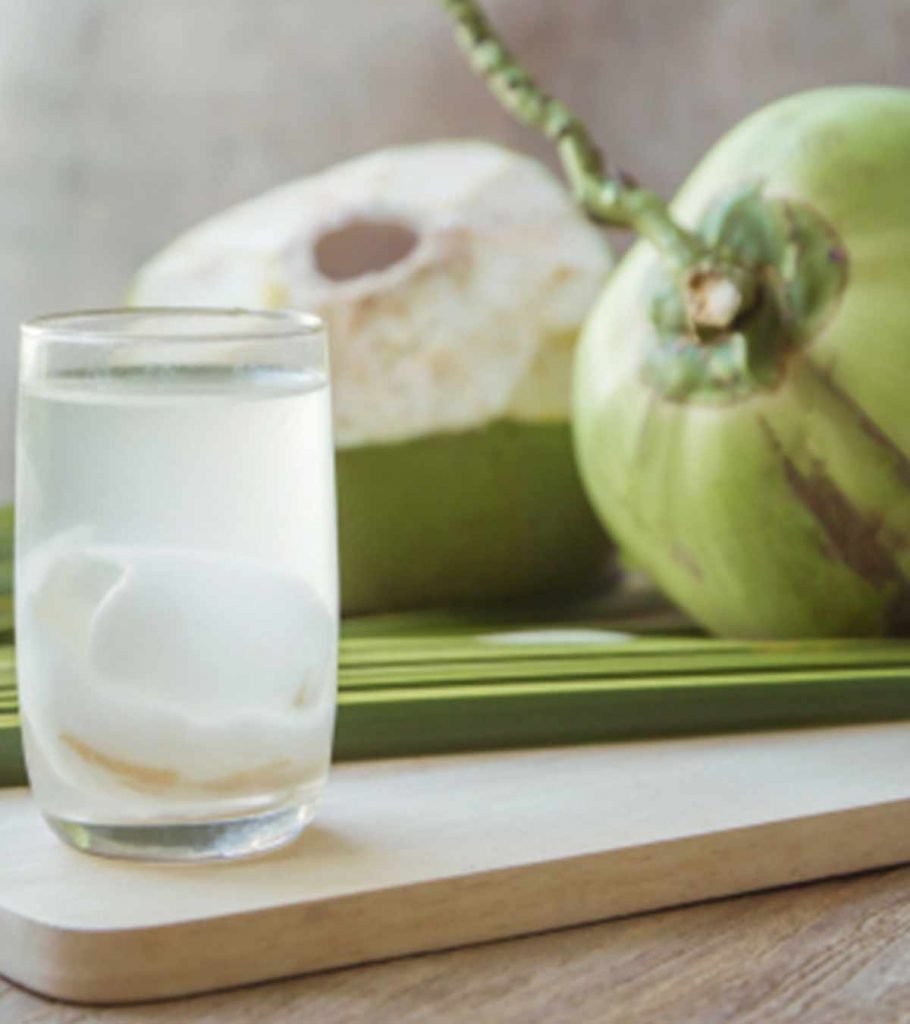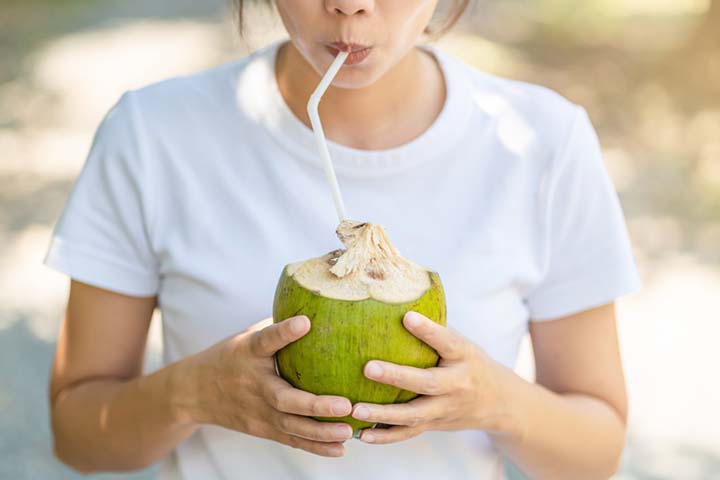Coconut water is a refreshing beverage that possesses distinctive nutritional, medicinal, and therapeutic properties. In some cultures, coconut water when breastfeeding is used as a galactagogue to increase breast milk production and supply. Perhaps that is why its use to treat ailments like dehydration is common in folk medicine (1).
However, this purported coconut benefit is still under research. Read on as we tell you more about the safety of coconut water for lactating women, its effect on breast milk supply, and possible health benefits this mild sweet liquid from tender green-colored drupe can offer breastfeeding mothers.
Is Coconut Water Safe During Breastfeeding?
There is no clinical recommendation on the safety of coconut water use during breastfeeding (2). Lactation experts generally consider coconut water safe for healthy mothers with no severe medical conditions (3).
In contrast, breastfeeding mothers with health conditions, including high/low blood pressure, kidney problems, and recent surgery, are advised to avoid coconut water. If you have any health condition or are on some medication, then take your doctor’s advice before consuming coconut water.
How Much Coconut Water Can You Consume In A Day?
While there is no fixed amount of coconut water for lactating women, most breastfeeding women can safely consume one to two cups a day. However, a nutritionist can give an individualized recommendation based on your overall dietary intake.
Does Consuming Coconut Water Increase Breast Milk Supply?
Coconut water has been traditionally used as a galactagogue in various parts of the world. According to lactation experts, a well-balanced diet with various beverages, including coconut water, may increase the breast milk supply (3). However, there are no clinical studies to demonstrate the effectiveness of coconut water in regulating breast milk supply.
Nevertheless, adding fresh coconut water to your breastfeeding diet can provide several benefits as they are rich in vitamins, amino acids, enzymes, and phenolic acids that may support your postpartum recovery as well as hydrate you (4).
Nutritional Value Of Tender Coconut Water
A cup of tender coconut water (240 grams) provides carbohydrates, and essential nutrients, including potassium, sodium, and magnesium (5) (6). The following is the list of the significant nutrients found in tender coconut water, and the maternal recommended dietary allowance (RDA) of nutrients.
| Name | Amount | RDA during lactation |
|---|---|---|
| Water | 228g | – |
| Energy | 45.6Kcal | – |
| Carbohydrate, by difference | 8.9g | – |
| Calcium, Ca | 57.6mg | 1000mg (19-50 years) |
| Magnesium, Mg | 60mg | 310mg (19-30 years)
320mg (31-50 years) |
| Phosphorus, P | 48mg | 700mg (19-50 years) |
| Potassium, K | 600mg | 2800mg AI* (19-50 years) |
| Sodium, Na | 252mg | 1500mg AI* (14-50 years) |
*AI = Adequate Intake
Sources: U.S. Department of Agriculture and Oregon State University
Note: Mature coconut water is nutritionally different from the tender coconut water.
Possible Health Benefits Of Tender Coconut Water When Breastfeeding
Fresh coconut water is a low-calorie beverage that may support your overall health when breastfeeding.
- Provides hydration: Tender coconut water has abundant water content and micronutrients that support hydration (1). It is an ideal replacement for high sugar drinks, such as fruit juice, and caffeinated beverages, such as coffee and soda.
- Supports digestion: Consuming coconut water may help improve digestion and digestive health (7), due to the presence of lauric acid, which may aid in promoting the absorption processes (8).
- Supports immunity: Antioxidants and lauric acid in tender coconut water have shown, in research, to display antioxidant, antimicrobial, anti-inflammatory, and immunostimulant properties (4) (9).
- Benefits overall health: Research notes that coconut water has hypoglycemic (reduces excess blood sugar), antihypertensive (reduces high blood pressure), and hepatoprotective (liver protection) properties (8) (9) (10) due to the presence of amino acids and enzymes. It may also aid weight loss, as it is fat and cholesterol free.
- Helps reduce swelling: Coconut water works like a natural diuretic, increasing urine production. Animal studies show that when coconut water is part of a regular routine, it helps boost urine excretion. This aids in getting rid of ions, such as sodium and chloride. Unlike synthetic diuretic drugs, coconut water doesn’t interfere with calcium levels or the balance of acids and bases. That way, it lowers the chances of messing up the electrolyte balance. Moreover, coconut water can control liquid levels and cut the production of proteins in water reabsorption. This suggests coconut water’s diuretic effects are achieved by influencing key physiological pathways. So, coconut water could be a natural substitute for common diuretics (11).
Note that most benefits of coconut water require further research, especially in the context of breastfeeding.
Precautions To Take While Consuming Coconut Water When Breastfeeding
You may follow these precautions to ensure a safe intake of coconut water during the lactation period.
- If you have or had kidney problems or blood pressure-related issues, then speak to a doctor before consuming coconut water. If you had a C-section and are still recovering, then, too, consult the doctor.
- If you are on any medication or supplement, then take the doctor’s advice before consuming coconut water.
- Prefer fresh tender coconut water to packaged coconut water. Fresh coconut water is perishable and hence should not be kept at room temperature for more than two hours.
- If you need to buy packaged coconut water, buy from a reputable brand to ensure product quality.
- Check the packaging date of packaged coconut water, and the presence of any other ingredients, such as sugar and preservatives.
- Store an unopened pack of packaged coconut water in a clean, dry place away from direct sunlight.
- Refrigerate an open pack and consume the product within 24 hours.
- Consume coconut water in moderation as high amounts may increase the risk of developing hyperkalemia (high levels of potassium in the blood) (12).
Tender coconut water when breastfeeding can be refreshing and nourishing. You may replace tea, coffee, and fruit juices with this water to enjoy the taste and feel rejuvenated. However, you must know how to consume it in moderation as a part of a well-balanced diet. It is high in nutrients and provides great relief during summers. Due to its medicinal and therapeutic properties, it is an excellent source of hydration and has good taste. Ensure to have it while it’s still fresh.
Key Pointers
- Coconut water is a hydrating and nourishing drink that is rich in minerals like calcium, magnesium, and potassium.
- There are no sufficient studies on the safety or recommended amount of coconut water consumption for lactating women, but it is considered suitable for overall health.
- Lactation experts suggest that a balanced diet and proper hydration, including coconut water, may help maintain breast milk supply.
- It is important to choose fresh and tender coconut water from a reliable store/brand.
- Women who are on any medications or have a prior history of kidney or blood pressure disorders should consult a doctor before consuming coconut water.















